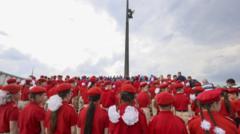The first peace talks in three years between Ukraine and Russia faced significant challenges, including logistical chaos and diverging objectives. President Zelensky seeks an unconditional ceasefire, while Putin's strategy reflects confidence in military power.
Turbulent Peace Talks: Ukraine and Russia Struggle for Dialogue

Turbulent Peace Talks: Ukraine and Russia Struggle for Dialogue
Confusion reigns as Ukraine and Russia attempt to initiate peace talks amid an ongoing conflict, with contrasting demands and absent leaders.
Ukrainian and Russian delegations descended upon Turkey yesterday for a long-awaited round of peace negotiations, the first in three years. However, confusion marred the proceedings, with representatives from both nations in separate cities, casting doubt on potential discussions. President Vladimir Putin was notably absent from the Istanbul meeting, delegating a midlevel delegation to handle negotiations, while Ukraine's President Volodymyr Zelensky opted to meet with Turkey’s president in Ankara, eventually sending a streamlined team led by the defense minister to Istanbul.
Meanwhile, U.S. President Donald Trump made a significant statement, asserting that no progress would be made until he and Putin could meet, emphasizing the complexities surrounding peace initiatives. Despite the confusion, Russian and Ukrainian officials hinted that discussions might still proceed but could be delayed until today.
The background of this disjointed diplomacy reveals a stark divide in expectations between Moscow and Kyiv regarding the resolution of the conflict. Zelensky is advocating for an immediate and unconditional ceasefire as a precursor to peace negotiations, while Putin, buoyed by perceived military success, is resistant to halting hostilities without securing a favorable deal first. This impasse underscores the broader challenges facing diplomacy as both nations grapple with the realities of war and the path to reconciliation.




















